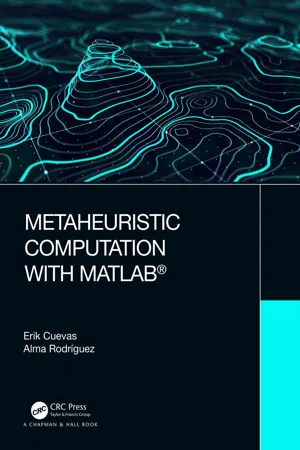
- 260 pages
- English
- ePUB (mobile friendly)
- Available on iOS & Android
Metaheuristic Computation with MATLAB®
About this book
Metaheuristic algorithms are considered as generic optimization tools that can solve very complex problems characterized by having very large search spaces. Metaheuristic methods reduce the effective size of the search space through the use of effective search strategies.
Book Features:
- Provides a unified view of the most popular metaheuristic methods currently in use
- Includes the necessary concepts to enable readers to implement and modify already known metaheuristic methods to solve problems
- Covers design aspects and implementation in MATLAB®
- Contains numerous examples of problems and solutions that demonstrate the power of these methods of optimization
The material has been written from a teaching perspective and, for this reason, this book is primarily intended for undergraduate and postgraduate students of artificial intelligence, metaheuristic methods, and/or evolutionary computation. The objective is to bridge the gap between metaheuristic techniques and complex optimization problems that profit from the convenient properties of metaheuristic approaches. Therefore, engineer practitioners who are not familiar with metaheuristic computation will appreciate that the techniques discussed are beyond simple theoretical tools, since they have been adapted to solve significant problems that commonly arise in such areas.
Tools to learn more effectively

Saving Books

Keyword Search

Annotating Text

Listen to it instead
Information
CHAPTER 1
Introduction and Main Concepts
OBJECTIVE
1.1 Introduction
Table of contents
- Cover
- Half Title
- Title Page
- Copyright Page
- Table of Contents
- Preface
- Acknowledgments
- Authors
- Chapter 1 ▪ Introduction and Main Concepts
- Chapter 2 ▪ Genetic Algorithms (GA)
- Chapter 3 ▪ Evolutionary Strategies (ES)
- Chapter 4 ▪ Moth–Flame Optimization (MFO) Algorithm
- Chapter 5 ▪ Differential Evolution (DE)
- Chapter 6 ▪ Particle Swarm Optimization (PSO) Algorithm
- Chapter 7 ▪ Artificial Bee Colony (ABC) Algorithm
- Chapter 8 ▪ Cuckoo Search (CS) Algorithm
- Chapter 9 ▪ Metaheuristic Multimodal Optimization
- Index
Frequently asked questions
- Essential is ideal for learners and professionals who enjoy exploring a wide range of subjects. Access the Essential Library with 800,000+ trusted titles and best-sellers across business, personal growth, and the humanities. Includes unlimited reading time and Standard Read Aloud voice.
- Complete: Perfect for advanced learners and researchers needing full, unrestricted access. Unlock 1.4M+ books across hundreds of subjects, including academic and specialized titles. The Complete Plan also includes advanced features like Premium Read Aloud and Research Assistant.
Please note we cannot support devices running on iOS 13 and Android 7 or earlier. Learn more about using the app